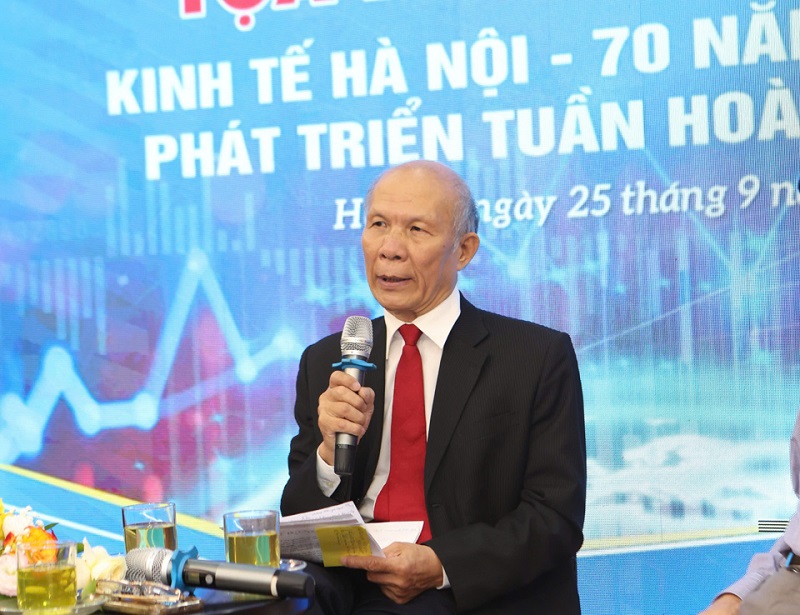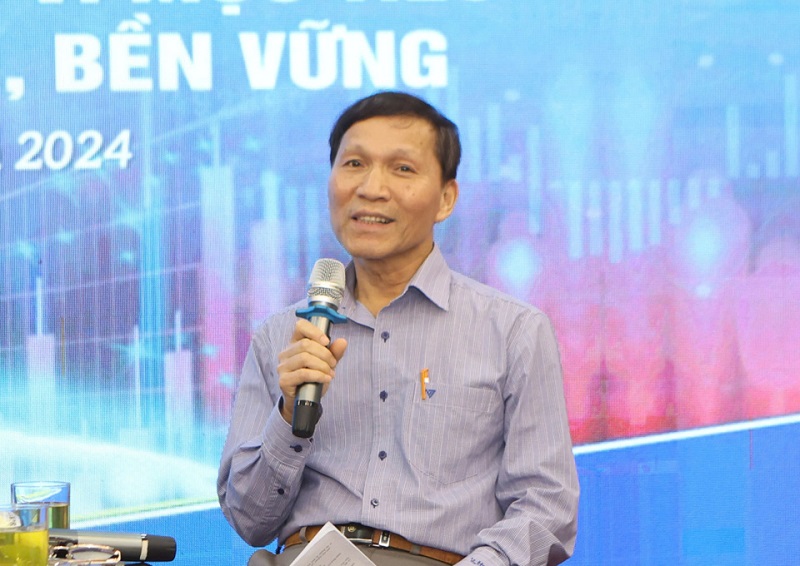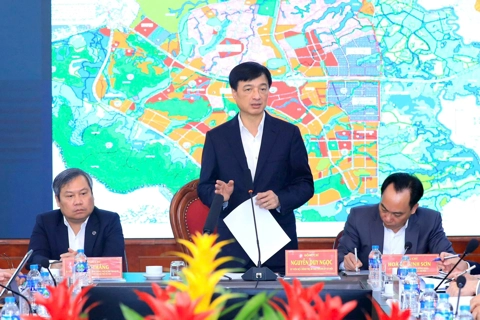Hanoi progresses with sustainable economy in 70 years: experts
Since its liberation in October 1954, the capital has achieved significant economic development and is progressing towards a sustainable, green model.
Hanoi's economy is shifting towards a more modern, sustainable, greener, and cleaner model, said Dinh Trong Thinh, former Head of the International Finance Department at the Academy of Finance, today (September 25).
| The seminar on Hanoi's sustainable economic growth was held today (September 25). Photo: The Hanoi Times |
Speaking at the seminar titled "Hanoi’s Economy – 70 Years Toward a Circular Economy and Sustainable Development," organized by the Kinh te & Do thi (Economic & Urban) Newspaper, Thinh summarized Hanoi's 70-year development journey.
He recalled that upon liberation on October 10, 1954, Hanoi was a small city of about 130 km², with a weak economy and around 1,000 businesses. At that time, the city's GDP per capita was significantly lower than in other localities and regional cities.
"Hanoi eradicated illiteracy by 1957, transforming the workforce and bolstering the capital's independence and resilience," Thinh noted.
By 1965, Hanoi had emerged as the largest industrial center in the North, playing a crucial role in supporting war efforts and driving industrial development nationwide. By 1986, it had also established itself as a hub for scientific and technological innovation.
"Economic management reforms have positioned the capital as a bright spot in the country’s growth," he stated.
In 1999, UNESCO designated Hanoi as a “City for Peace,” and in 2000, it was recognized as a “Heroic Capital.” The city expanded its administrative boundaries in 2008, enabling its economic structure to modernize and become more sustainable, greener, and cleaner, the expert explained.
From 2010 to 2023, Hanoi's economy experienced robust growth, often leading the country with an average growth rate of around 7%. In 2023, Hanoi's per capita income exceeded that of Ho Chi Minh City for the first time.
| Dinh Trong Thinh, former Head of the International Finance Department at the Academy of Finance. Photo: The Hanoi Times |
"In recent years, Hanoi has gradually transformed its economic structure towards services and a greener, cleaner economy faster than other localities," Thinh noted.
During the 2020-2022 period, despite the impact of the COVID-19 pandemic, Hanoi's economy continued to grow comparatively strong to the national average.
Tourism, trade, and services at the forefront
Le Quoc Phuong, former Deputy Director of the Industrial and Commercial Information Center under the Ministry of Industry and Trade, highlighted tourism, trade and services as the economic spearheads for the Capital.
"Hanoi’s economic model has seen positive changes, with trade, services, and tourism being prioritized, which are new global economic models," Phuong commented.
He cited that the service sector now accounts for nearly two-thirds of Hanoi's Gross Regional Domestic Product (GRDP), indicating that the city is on the right path in transforming its economic structure.
Hanoi's retail system, comprising around 30 shopping centers, nearly 150 supermarkets, 455 markets, and thousands of convenience stores, is vital for meeting residents' needs and supporting production and business growth, thus fueling economic expansion.
The city also ranks among the top 10 in the world for the fastest-growing tourism industry and is the 15th most popular tourist destination globally. In 2023, Hanoi welcomed 24 million visitors, including 20 million domestic and 4 million international tourists.
In 2023, Hanoi accounted for nearly 9% of the country’s total import-export turnover, ranking 8th among 63 provinces and cities. The industrial and construction sectors contribute approximately 16% of the city’s total economic output. Hanoi has nine operating industrial parks covering 1,670.6 hectares, with three additional parks under construction spanning 663.4 hectares.
The city has also attracted around 4,500 foreign direct investment (FDI) projects, with total registered capital exceeding $33 billion. Additionally, Hanoi is home to 1,350 craft villages, 313 of which are recognized as traditional.
| Le Quoc Phuong, former Deputy Director of the Industrial and Commercial Information Center under the Ministry of Industry and Trade. Photo: The Hanoi Times |
"Hanoi contributes 16% of the national GDP, 18.5% of the state budget, and 20% of domestic revenue, fully deserving its role as a major economic and international trade center and a driving force for development in the Red River Delta and the country," Phuong said.
He also emphasized Hanoi's critical role not only as the political-administrative center of Vietnam but also as a major hub for culture, science, education, and international exchanges.
Furthermore, with its strategic location as a transport hub, Hanoi can easily connect with provinces in the Red River Delta, northern Vietnam, the rest of the country, and the world.
At the seminar, experts expressed optimism that, with the momentum gained over the past 70 years, combined with its advantages and determination, Hanoi will soon achieve new breakthroughs, improving labor productivity and contributing more significantly to national economic development.
They also noted that if the city succeeds in transitioning to a green, clean, smart, and modern city, Hanoi will continue to be a leader in both the region and the country.














